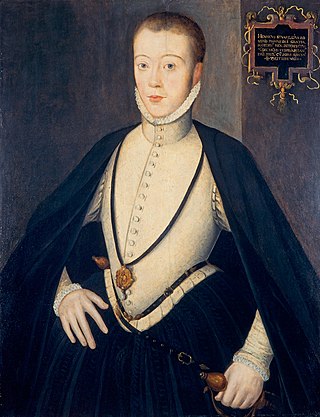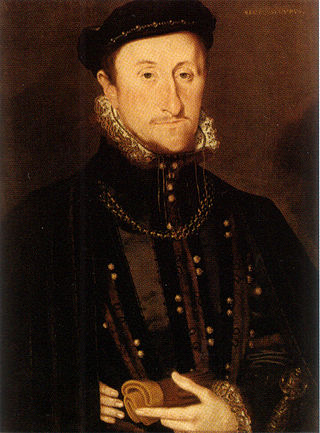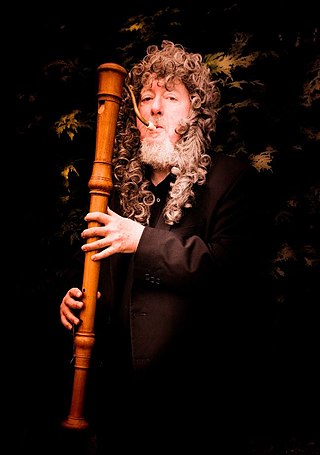
Henry Stuart, Lord Darnley, was the second husband of Mary, Queen of Scots, and the father of James VI of Scotland and I of England. Through his parents, he had claims to both the Scottish and English thrones, and from his marriage in 1565 he was king consort of Scotland. Less than a year after the birth of his son, Darnley was murdered at Kirk o' Field in 1567. Many contemporary narratives describing his life and death refer to him as simply Lord Darnley, his title as heir apparent to the Earldom of Lennox.

Dumbarton is a town in West Dunbartonshire, Scotland, on the north bank of the River Clyde where the River Leven flows into the Clyde estuary. In 2006, it had an estimated population of 19,990.

James Stewart, 1st Earl of Moray was a member of the House of Stewart as the illegitimate son of King James V of Scotland. A supporter of his half-sister Mary, Queen of Scots, he was the regent of Scotland for his half-nephew, the infant King James VI, from 1567 until his assassination in 1570. He was the first head of government to be assassinated with a firearm.

The Edinburgh Festival Fringe is the world's largest performance arts festival, which in 2019 spanned 25 days and featured more than 59,600 performances of 3,841 different shows in 322 venues. Established in 1947 as an alternative to the Edinburgh International Festival, it takes place in Edinburgh every August. The Edinburgh Festival Fringe has become a world-leading celebration of arts and culture, surpassed only by the Olympics and the World Cup in terms of global ticketed events. As an event it "has done more to place Edinburgh in the forefront of world cities than anything else" according to historian and former chairman of the board, Michael Dale.

Alloa Tower in Alloa, Clackmannanshire, in central Scotland, is an early 14th-century tower house that served as the medieval residence of the Erskine family, later Earls of Mar. Retaining its original timber roof and battlements, the tower is one of the earliest and largest Scottish tower houses, with immensely thick walls. It was designated as a scheduled monument in 1960 and is now owned by the National Trust for Scotland.

Andy Gray was a Scottish actor and writer from Perth, Scotland.
Shauna Macdonald is a Scottish actress. She began her career starring in The Debt Collector (1999). She then had her breakthrough starring as Sam Buxton in the television series Spooks (2003–2004). After departing the series, she starred as Sarah Carter in the horror film The Descent (2005), the role for which she is best known. She gained widespread recognition and praise for her performance, and was nominated for the Saturn Award for Best Actress. The film established Macdonald as a scream queen. She reprised her role in its sequel The Descent Part 2 (2009).

Blazin' Fiddles are a contemporary Scottish fiddle band from the Highlands and Islands. They formed in 1998 to showcase Scotland's distinct regional fiddle styles. The band have a number of awards, including; the MG ALBA Scots Trad Music Awards Live Act of the Year, Album of the Year and Folk Band of the Year. Their records are released on their own indie Blazin' Records label. They have been described as "...the LED Zepplin of the Folk World."
Thomas Kelman Fleming, FRSAMD was a Scottish actor, director, and poet, and a television and radio commentator for the BBC.
Robert McLellan OBE (1907–1985) was a Scottish Renaissance dramatist, writer and poet and a leading figure in the twentieth century movement to recover Scotland’s distinctive theatrical traditions. He found popular success with plays and stories written in his native Scots tongue and is regarded, alongside William Lorimer, as one of the most important modern exponents of fine prose in the language.
The Glasgow Unity Theatre was a theatre group that was formed in 1941, in Glasgow. The Unity theatre movement developed from workers' drama groups in the 1930s, seeing itself as using theatre to highlight the issues of the working class being produced by and for working-class audiences. Its demands were "for new Scots plays by new Scottish writers to be performed by native actors." The movement had strong links with the Communist Party of Great Britain and the Left Book Club Theatre Guild.

Theatre in Scotland refers to the history of the performing arts in Scotland, or those written, acted and produced by Scots. Scottish theatre generally falls into the Western theatre tradition, although many performances and plays have investigated other cultural areas. The main influences are from North America, England, Ireland and from Continental Europe. Scotland's theatrical arts were generally linked to the broader traditions of Scottish and English-language literature and to British and Irish theatre, American literature and theatrical artists. As a result of mass migration, both to and from Scotland, in the modern period, Scottish literature has been introduced to a global audience, and has also created an increasingly multicultural Scottish theatre.

Jack Andrew Lowden is a Scottish actor. Following a four-year stage career, his first major international onscreen success was in the 2016 BBC miniseries War & Peace, which led to starring roles in feature films.

Scottish opera is a subgenre of Scottish music. This article deals with three separate, but overlapping subjects:

John Sampson is a Scottish multi-instrumental musician, actor and entertainer.
The Gateway Theatre was a Category C listed building in Edinburgh, Scotland, situated on Elm Row at the top of Leith Walk.

Mary, Queen of Scots is an opera in three acts composed by Thea Musgrave. Musgrave also wrote the libretto based on Peruvian writer Amalia Elguera's play Moray. It focuses on events in the life of Mary, Queen of Scots, from her return to Scotland in 1561 until 1568 when she was forced to flee to England. The opera premiered on 6 September 1977 at the King's Theatre in Edinburgh performed by Scottish Opera. It has subsequently had multiple performances in the UK, US, and Germany. A chamber version, produced by Musgrave in 2016, also exists.
James Stewart, 1st Lord Doune (1529-1590) was a Scottish landowner.

On 19 August 1561, the 18-year-old Mary, Queen of Scots, returned to Scotland from France following the death of her husband King Francis II of France the previous winter. On 2 September the town of Edinburgh organised a celebration of royal entry for her.
Dr. David Purves was a Scottish environmental scientist, playwright and poet, and a champion of the Scots language.












